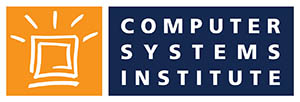Learning in a new country is an exciting adventure for any international student. However, mastering a new language can be tricky. Improving your English as an international student can shape your academic and social experiences. Our team at Computer Systems Institute wants to help you integrate into your new environment while enhancing your English skills. Our practical steps will assist you on your linguistic journey, from engaging in conversations with native speakers to immersing yourself in the language.
Engage in Conversations With Native Speakers
This real-world practice enhances your understanding of the language’s nuances and helps you grasp colloquial expressions and idioms. It also improves your pronunciation and listening skills.
Start by attending community events or finding a language exchange partner. Don’t be afraid to make mistakes—native speakers are often patient and willing to help. This direct interaction will build your confidence and fluency over time.
Utilize Language Learning Apps
Technology is all around us, and language learning apps are at your fingertips. Apps such as Duolingo, Babbel, and Rosetta Stone offer interactive lessons that cater to different learning styles. They combine vocabulary building with grammar exercises and listening activities, providing a well-rounded approach to language acquisition.
The convenience of these apps allows you to practice English anytime, anywhere, making language learning more accessible than ever. Regular use of these tools will reinforce new words and concepts, enhancing your language skills progressively.
Read English Books and Articles

Reading is an excellent way to improve your language proficiency. Start with books and articles that match your current level and gradually challenge yourself with more complex texts. This practice will expand your vocabulary and improve your comprehension skills.
Choose topics that interest you to make reading enjoyable and engaging. Maintaining a regular reading practice will expose you to various writing styles and enrich your understanding of English syntax and grammar, whether you read fiction, non-fiction, or news articles.
Watch English Movies and TV Shows
Watching movies and TV shows in English is both entertaining and educational. It’s also a fantastic way to improve your listening skills and familiarize yourself with different accents and dialects.
Pay attention to the dialogue and try to understand the context without subtitles. You can always rewind and repeat scenes to catch unfamiliar phrases. This method improves your auditory comprehension and introduces you to cultural references and everyday English usage.
Listen to English Music and Podcasts
Music and podcasts are great resources for enhancing your English skills while enjoying your favorite tunes or topics. Listening to English music can help with pronunciation and rhythm, while podcasts cover a range of subjects. All of which will improve your listening comprehension and expand your vocabulary.
Try to follow the lyrics or transcripts to better understand what you hear. Integrating these into your daily routine makes language learning more enjoyable and less of a chore. Plus, listening to music or podcasts allows you to absorb English naturally.
Participate in ESL Programs
Enrolling in ESL programs designed specifically for non-native speakers is a strategic step in mastering English. These programs provide structured learning environments with experienced instructors who can guide you through the language’s complexities.
ESL programs often focus on reading, writing, speaking, and listening, offering a holistic approach to language learning. They also provide opportunities to meet fellow international students, creating a supportive community where you can practice and improve together.
Join English-Speaking Clubs or Events
English-speaking clubs and events are excellent platforms for practicing your language skills in a social setting. These gatherings offer a relaxed environment where you can engage in discussions, debates, and activities that promote English usage.
Clubs focused on English speaking also provide the opportunity to meet like-minded individuals who share your interests and aspirations. Participating in clubs or events helps you apply what you’ve learned in a real-world context, making language learning more dynamic and interactive.
Attend Workshops and Seminars
Workshops and seminars are valuable for honing your English skills while gaining knowledge in specific areas of interest. These events often feature expert speakers and interactive sessions, encouraging you to engage in meaningful discussions and ask questions.
Attending these gatherings allows you to practice listening and speaking in a professional context, sharpening your language skills and boosting your confidence. They also provide networking opportunities, connecting you with professionals and peers who can offer guidance and support.
Practice Writing Daily
Writing is a critical component of language learning that strengthens your grammar and vocabulary. Dedicate time each day to writing, whether you keep a journal, draft emails, or compose essays.
Focus on clarity and coherence, and don’t hesitate to seek feedback from peers or instructors. A regular writing practice will improve your ability to express your thoughts and ideas clearly, enhancing your written and spoken communication skills. Over time, this habit will result in more polished and professional English writing.
Set Specific Language Goals
Setting specific, achievable language goals is essential for tracking your progress and staying motivated. A clear goal provides direction and purpose, whether it’s learning a certain number of new words each week or mastering a challenging grammar rule.
Break down larger objectives into manageable tasks and celebrate small victories along the way to build momentum. Establishing these targets helps you maintain focus and accountability, ensuring continuous growth in your English proficiency.
Use Flashcards for Vocabulary Building

Flashcards are an effective tool for expanding your vocabulary in a fun and engaging way. Create flashcards with new words and their definitions and review them regularly to reinforce learning. You can also include example sentences to understand how to use certain words with context.
Digital flashcard apps, such as Quizlet, offer additional features, such as spaced repetition, which optimizes your study sessions. Consistent use of flashcards will enhance your vocabulary retention, making it easier to recall and use new words fluently.
Immerse Yourself in the Language
Immersion is one of the most powerful ways to learn a language. Surround yourself with English by integrating it into your daily life as much as possible. Switch your phone and computer settings to English, think in English, and even talk to yourself in English.
Immersing yourself helps you internalize the language naturally, facilitating quicker learning. This approach enables you to develop a deeper understanding of English, bridging the gap between classroom learning and real-world application.
Improving your English as an international student is a rewarding endeavor that facilitates countless opportunities. Remember to set clear goals, practice regularly, and be patient with yourself as you progress. You’ll notice an improvement in your personal growth and global connections as your skills develop.
Let Computer Systems Institute help you learn English today! Check out our ESL programs, where you can acquire hands-on learning to better grasp the English language.







